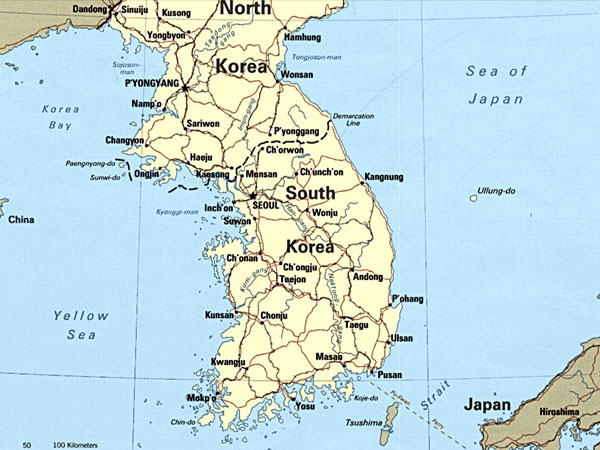Korea struggles to contain MERS; becomes 4th with most cases
Seoul authorities on Sunday scrambled to block the spread of Middle East Respiratory Syndrome by establishing a new task force consisting of government authorities as well as civil medical experts and facilities.
As of Monday morning, 18 cases had been confirmed in Korea, surpassing Qatar as the country with the fourth-most MERS cases in the world. The hospital where more than 10 people are believed to have been infected by the first confirmed patient prior to his official diagnosis was temporarily shut down.
BACKSTORY: S. Korean health chief apologizes over MERS outbreak
Health Minister Moon Hyung-pyo offered an apology Sunday for the government’s poor handling of the potential MERS patients, and announced that the new task force would put forth its best efforts to combat the spread of the disease. With the establishment of the team, potential MERS patients who are considered the most vulnerable ― those who are aged 50 or older and those with chronic conditions, such as diabetes or heart disease ― will be quarantined with extra medical attention and care.
“We are considering this coming week as a crucial turning point in which the situation can either get worse or better,” the minister said during a press meeting in Seoul.
“We believe all of the 14 cases, except the very first case, are secondary infection cases. The government is doing its best to prevent tertiary infection. And in order to do this, we need cooperation from all health care workers and citizens.”
Article continues after this advertisementThe first confirmed patient, quarantined as of May 20, had visited four medical clinics and hospitals over the course of 10 days prior to his diagnosis, from May 11-20.
Article continues after this advertisementREAD: China confirms first case of MERS, a South Korean man
The incubation period of MERS is two to 14 days, and all of the confirmed patients contacted the first patient, who is believed to be the sole spreader of MERS in Korea, from May 15-17. As the first patient stayed at another clinic ― the last of the four ― prior to his diagnosis from May 17-20, more people may be diagnosed this week as the incubation period of those who may have been infected at the medical facility lasts until Thursday.
Among the 14 patients who are believed to be infected by him, 12 worked or stayed at the same facility as the 68-year-old, who was being treated there as an inpatient from May 15-17. The facility is the second of the four clinics he visited or stayed at before being quarantined.
The remaining two patients are health care workers who treated the first patient prior to his diagnosis, at two different medical clinics, on May 15 and 17, respectively. The average age of all 15 patients is 53.1 years old.
As the number of confirmed patients rose from 1 to 15 within only 11 days, there has been a growing public demand for the government to identify the now-temporarily closed hospital where 12 people were infected. Rumors claiming certain hospitals to be avoided have been going viral since last week, especially via social media and KakaoTalk.
The government said hospitals that are related to any infectious diseases cannot be identified according to its protocol, as such facilities and those who stay there can easily be targets of social stigmatization. The Health Ministry and the police also announced that those who spread such rumors online can face punishment.
The Health Ministry has been under fire for its inept handling of the spread of MERS, especially after the diagnosis of the fourth patient whose earlier request to be quarantined had been rejected by the authorities.
The government also failed to prevent the 10 patient, who is the son of the third patient and the younger brother of the fourth, from going overseas on May 26. Although he was not diagnosed with MERS prior to leaving the country for China, he had already been showing symptoms including a fever.
He was eventually diagnosed with MERS in China on Friday. Seoul’s failure to prevent him from leaving the country left 165 passengers and crew members on board with him at potential risk of infection. Once arriving in Hong Kong by plane, the man travelled to China by taking two buses. According to Chinese news outlets, it is not known how many passengers were on the buses.
To prevent tertiary infection cases, Health Minister Moon asked the public to report to the authorities if they are experiencing MERS symptoms ― a high fever and coughing ― after visiting the Middle East, as well as to wash their hands properly and to wear masks in public places. He also urged all health care workers to be alert of the situation and file a report immediately if they come across a patient who may have MERS.
On top of the two newly confirmed cases, an enlisted soldier, as well as 30 of his colleagues, were isolated on Sunday as he reported that he spent time with his mother, who was later diagnosed with MERS, during his recent break on May 12. Although quarantined, the soldier and his colleagues were not showing any symptoms.
MERS is known to be caused by coronaviruses, a large family of viruses that cause a range of illnesses in humans from the common cold to severe acute respiratory syndrome.
There is no known cure or vaccine for MERS, which has a fatality rate of 40.7 per cent.
More than 95 per cent of the confirmed cases worldwide were in the Middle East, particularly Saudi Arabia and the United Arab Emirates. The two countries have the highest number of MERS patients ― 996 and 74, respectively ― followed by Jordan and Korea.
